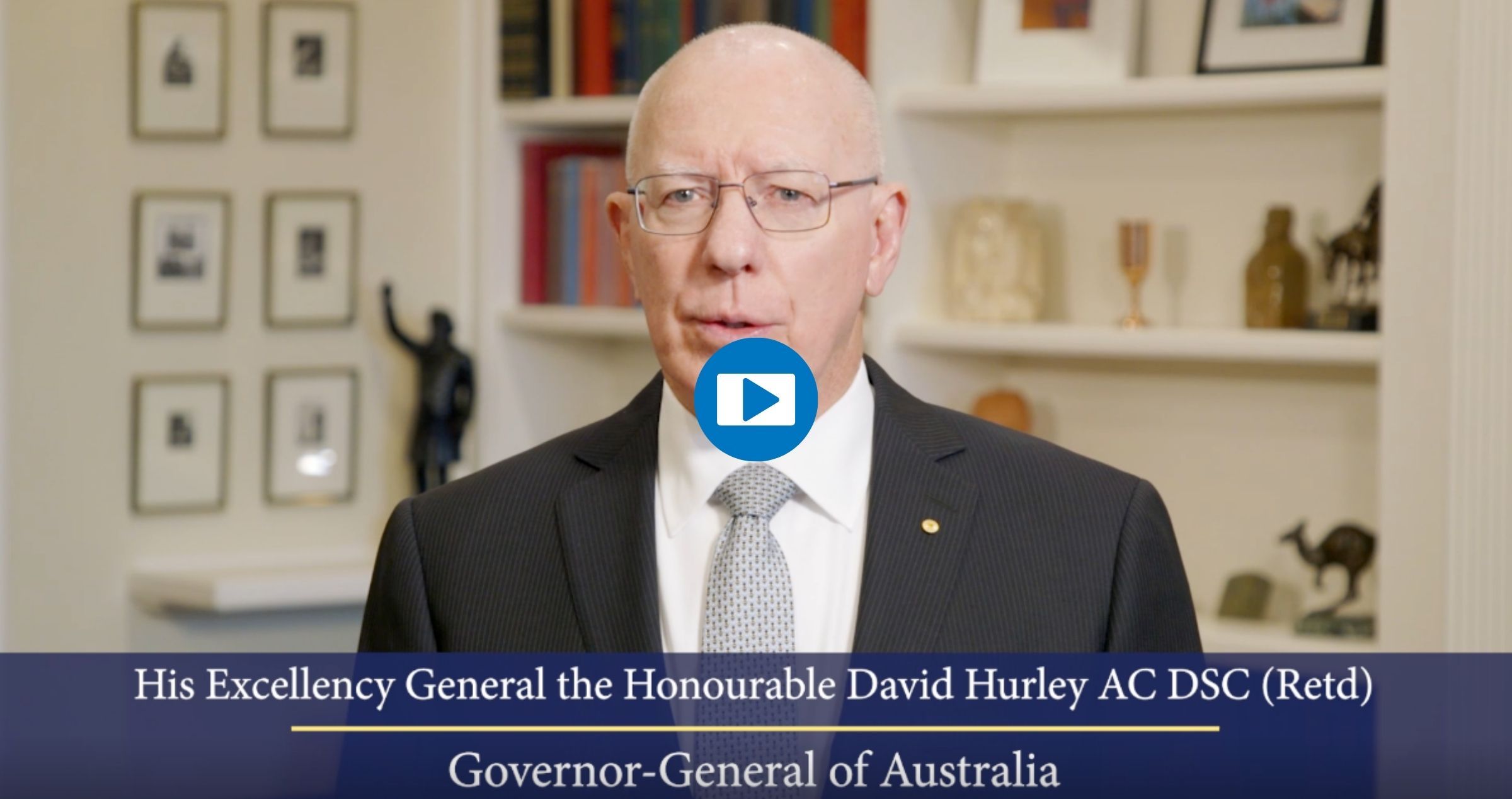Share
SYDNEY, THURSDAY 8 OCTOBER: – Glaucoma Australia and its Patron, the Governor-General of Australia, His Excellency the Honourable David Hurley, are pleased to announce the 2020 recipient of the charity's ‘Quinlivan’ Research Grants Program. This year’s glaucoma research grant is awarded to Dr Flora Hui, Research Fellow at the Centre for Eye Research Australia (CERA). “I am especially pleased to share this exciting announcement today, on World Sight Day,” said the Governor-General. “I extend my congratulations to Dr Hui and my sincere thanks to all of the dedicated Australian glaucoma researchers, for their work in the fight against glaucoma blindness.”

In a world-first clinical trial led by the Centre for Eye Research Australia (CERA) and supported by Glaucoma Australia, Dr Flora Hui will investigate whether daily doses of vitamin B3 (nicotinamide) could provide long-term protection against nerve cell damage and prevent blindness in glaucoma.
Dr Flora Hui led the earlier study that was first to show that vitamin B3 led to early and significant improvements in visual function in people with glaucoma. Now, in partnership with Glaucoma Australia and international researchers, Dr Flora Hui and Professor Keith Martin will conduct a 2-year study to conclusively determine whether vitamin B3 can delay disease progression and thus be taken by patients on an ongoing basis. Independent of lowering eye pressure, vitamin B3 could be the first treatment that protects nerve cells in glaucoma, changing the way we treat and manage the disease.
Glaucoma Australia President, Associate Professor, Simon Skalicky said, “Over the last 10 - 15 years there has been a shift from looking at the “why” and “how” of glaucoma, which is still important, towards research that is focused on having a direct impact on patient care. We are seeing this in the selection of this year’s ‘Quinlivan’ Research Grant recipient, Dr Flora Hui; as well as last year’s recipients.”
“There is a lot of interest amongst glaucoma researchers, in medicines that might help protect the optic nerve from eye pressure-related glaucoma damage. Vitamin B3 is an example of this, and certainly there is much research value in exploring its potential benefits and uses,” Associate Professor Skalicky added.
Glaucoma Australia will fund $200,000 over 2 years, to support Dr Hui’s TAMING Glaucoma trial (Targeting Metabolic Insufficiency in Glaucoma with Nicotinamide) which could lead to the first therapy that promotes retinal ganglion cell health and survival in glaucoma.

Dr Hui explains, “Many high-risk glaucoma patients do not respond to intraocular pressure (IOP)-lowering treatments, and can continue to progress to blindness despite well-controlled IOP. In these patients, retinal ganglion cells are predicted to have increased vulnerability to risk factors such as mitochondrial dysfunction. Neuroprotective treatments (mechanisms and strategies that aim to protect the nervous system from injury and damage), that directly enhance retinal ganglion cell survival and function, will transform patient management and are of great therapeutic need.”
“The submissions to the ‘Quinlivan’ Research Grant scheme in 2020 were all of very high quality. It was wonderful to see such strong interest from the research community in pursuit of new knowledge designed to improve the lives of those with glaucoma,” said Professor Allison McKendrick, Glaucoma Australia’s Independent Research Panel Chair and Head of Department, Optometry & Vision Sciences, at the University of Melbourne.
“Nicotinamide, a form of vitamin B3, has the potential to be a safe and effective complement therapy to current glaucoma treatments and delay glaucoma progression in the longer term. The trial will involve 150 participants, diagnosed and treated for primary open angle glaucoma and is expected to run for three years” said Glaucoma Australia Research Committee Chair, James Christensen.
The next round of grants for research commencing in 2022 is expected to open on 14 June 2021, and close on 1 September 2021.
Contributions to this research are welcome by making a tax deductible donation to Glaucoma Australia today.
-ENDS-
For more information
Annie Gibbins
CEO Glaucoma Australia
(02) 9411 7722
ceo@glaucoma.org.au
Frequently Asked Questions
What is the study about?
Recent studies have shown that VitB3 can potentially slow down and regenerate some of the optic nerve damage that has been caused by glaucoma. It has shown to work on mice – the studies are now on humans with the hope of similar results. A smaller group study has shown positive results, the trial will now look into a larger group.
When does the study start?
Recruitment for participants to take part in the study starts in 2021. The exact date of commencement for the study has not been finalised yet.
Am I eligible to take part in the study?
Criteria for entry is:
- over 60 years of age
- Normal tension or Primary open angle glaucoma
- Moderate glaucoma: your eye specialist will be able to tell you if you fit into this category by the results of your field test
- No glaucoma or cataracts surgery at least 6 months prior to study starting. The start date of the study is not known yet. It will be in 2021.
- Be able to travel to a testing centre in Melbourne. A representative from CERA will provide you with further information regarding locations.
How can I be a part of the study?
All recruitment will be done by Centre for Eye Research Australia (CERA). A report from your ophthalmologist will be needed to assess your suitability for the study.
- You can register your interest via this form and CERA will contact you once recruitment opens: https://redcap.cera.org.au/redcap/surveys/index.php?s=WR7YC34XE4
- You can contact CERA for more information via:
- 03 9929 8360
- www.cera.org.au
- cera@cera.org.au - Your eye specialist or optometrist can register you by filling out this form: https://www.cera.org.au/refer-a-patient/
Can I take Vitamin B3 now?
Yes, you can. Vitamin B3 can be purchased over the counter at your local chemist/Pharmacy. Please follow dose as instructed on the bottle/packaging. It is advisable to speak to GP before starting.
If you end up being a participant in the Vitamin B3 study, you will be asked to stop intake of VitB3 at least 1 month before your first visit for the trial.
**Patients may find it helpful to know that by registering via the form, they may also be eligible for other clinical trials in the future apart from VitB3 **
About Dr Flora Hui
Dr Flora Hui is a clinician scientist working as a Research Fellow (Industry Engagement) at the Department of Optometry & Vision Sciences in the Faculty of Medicine, Dentistry and Health Sciences and a Research Fellow at the Centre for Eye Research Australia (CERA). In her role at the University of Melbourne, Flora aims to promote an environment of research translation and commercialisation, with a particular interest in innovative methods to improve patient outcomes in optometry and ophthalmology and neuroprotectants for treating glaucoma.
Flora completed a Master of Philosophy and Doctor of Philosophy in the basic sciences, concentrating on animal models of glaucoma and using the retina as a biomarker for the brain. She moved into glaucoma clinical research afterwards, focusing on developing novel clinical tools to shorten the time frame to detect glaucoma progression. This culminated in a world-first clinical trial investigating the potential of using high-dose nicotinamide as a neuroprotectant in human glaucoma. Building upon her pre-clinical work, Flora was involved in a landmark study investigating the use of hyperspectral retinal imaging to differentiate people who were diagnosed with Alzheimer's disease.
About Glaucoma Australia
Glaucoma Australia’s mission is to prevent sight loss by increasing early detection and improving treatment adherence. We aim to give hope to the 300,000 Australians who have glaucoma.
Our primary focus is on the 150,000 people who are completely unaware they have glaucoma and are therefore at risk of suffering preventable but irreversible blindness. In particular, we are committed to reaching the relatives of people with glaucoma and motivating them to have early and regular testing, due to the fact that they are 10 times more likely to develop glaucoma in their lifetime.
People who are diagnosed, especially early, can benefit from the most advanced medical treatments available to manage their condition successfully.
To achieve these aims, we work practically and collaboratively, with committed health professionals and exploit powerful internet based technologies to identify people with glaucoma, support them and improve treatment adherence.
In addition, we seek to raise funds for Australian researchers who share in our passion and mission. Since 2006, Glaucoma Australia has committed $1,024,783 to support Australian glaucoma researchers across a diverse range of projects. The grants announced today are the second to be awarded through the Glaucoma Australia’s ‘Quinlivan’ Research Grants Program launched in 2019. Glaucoma Australia also congratulates Dr George Kong of the Royal Victorian Eye and Ear Hospital, and Professor Jamie Craig or Flinders University on receiving their second year of grant funding for the continuation of their respective glaucoma research works awarded in 2019.
Glaucoma Australia is committed to supporting research which focuses on the following four domains which are framed around on our mission ‘to increase early detection and improve treatment adherence.’
1. Improving the rate and reliability of early detection of glaucoma
2. Improving the treatment and care experience
3. Improving the quality and experience of monitoring glaucoma progression
4. Providing management tools to improve the quality of life for people with glaucoma.
The Glaucoma Australia Research Grants are awarded following rigorous evaluation, based largely on the National Health and Medical Research Council (NHMRC) process, along with peer review, to ensure that the successful applicants meet the highest standards. Submissions are reviewed by the Glaucoma Australia Independent Research Panel consisting of internationally recognised experts in glaucoma research including the fields of Ophthalmology, Optometry and Pharmacy.
For more information on glaucoma visit www.glaucoma.org.au



